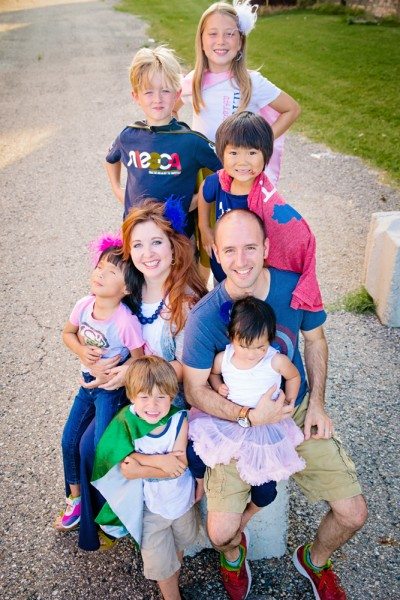Our children have stories that are a paradox of tragedy and beauty, of despair and hope. There is no easy answer to their stories. It’s complicated and so the way we handle it is complicated, and ever evolving.
Children are beautiful. They are full of hope and they believe in miracles. They believe in unicorns, and princes who come to save them, in magical swords and in lions who can speak. We draw inspiration from these tiny creatures who remind us of a time when we knew nothing of evil, nothing of pain, a time when we were so loved and protected that anything seemed possible.
But some children are denied that innate right to themselves. Their stories start with evil, with darkness. They never knew the whispers of hope. They never knew love. And when that happens, everything within you wants to recreate that magical childhood. We want to soften the blows of the past. We want to replace memories of horror with memories that leave fairy dust in their wake.
But that does not honor the truth. And that is our burden to carry. We have to find the middle ground between sprinkling fairy dust, and instilling hope.
We were taught early on, through many adoptive classes, not to create a fairy tale where there is none, regardless of how badly we want to do so. Yet, we want to honor and respect their birth parents and teach compassion and forgiveness even as we struggle through the truth that we don’t know the whys. We don’t know a lot of things. We offer possibilities, but we will never make up a story where we do not have the facts.
How do you walk through telling your child they were left as a toddler in the middle of a McDonalds, not forgotten, not accidentally left behind, but abandoned? Read that again, and let it sink in with all of its angles and horrors. There are bandaids of hope to put on it, that there was a note, that it was the only way to save the child’s life. As a mother, I can assure my children that this tore at the very soul of their birth family. But, as a child, I cannot undo the ugliness of the reality of abandonment, and it would be a terrible disservice to my children to not openly allow their pain, their grief to have center stage over that statement.
We intentionally create a safe place to speak the truth in our home. We speak into our children that the wrongs done to them were not their fault. There are moments when, in the middle of listening to another memory, I have to bury the extent of my own emotions. I deal with them later, because in this safe space of sharing, my only role is the listener who holds, who comforts, who speaks the truth that evil done to you is not a reflection of your own personhood.
A few practical ways that we create an environment of safe sharing in our home is to have two code phrases:
– We have instituted a CODE RED for anger that cannot be contained. It’s what we say when our emotions feel out of control and then we have an immediate removal policy. Everything stops. Everything. We remove, and create a safe place for that anger to be expressed and released.
– We have a policy that if you use the words, “I need to talk to you alone. I have something important to say,” you will be taken into a private space and given our full attention. This has created some of the best conversations of the past and security in the future.
We also make clear distinctions verbally between the past and the present. For instance, when hoarding takes place we have a conversation that goes like this:
“Why do you feel the need to hide your items?”
“Do you believe that your siblings will steal your things?”
“Do you feel safe here?”
“Is this feeling something from your life before us or is it because of something someone here is doing to you?”
With those two steps we are able to do two important things. We are able to honor emotions and work through them safely and we are able to honor the past while also putting it in its place, the past. We are able to separate what was from what is.
We also hear a lot of fear based questions. Will we send them back? What if someone takes them? What if they are lost, will we look for them?
And as a mom, I fall apart listening to those questions. I look back into the darkest of eyes and I reply, while crying, that I. am. Forever. My love is forever. I have had to promise that if tragedy strikes I will never, ever stop searching for them. I have had to verbally say that even if they leave me because of their own demons, that I will never stop loving, never stop searching. The very fact that I have had to speak those words breaks me. Because, I. am. forever. But my promise is diminished by the broken promises of those who came before me. All I can do is work every single day to build, brick by brick, an unshakeable trust in us, in family, and ultimately in love itself.
As parents we offer our children the hope of Christ, or rather we say that He is offering Himself to them. He is the foundation for all our hope. We teach that He is the Creator of all good things, that He restores what is broken. We remind them that His love is not bound in our goodness, rather it simply is. Love exists because He exists. He is our example of Love to them.
Regardless of all of our mistakes He remains as our constant source of Love; He removes our shame, soothes our hurtful pasts. It is our greatest hope that they will know Him, trust Him and remain ever secure in His love.
We are an adoptive family. We are where the past collides with the present. We are the bridge to the future of trust and love. We are a family with a story that spans the spectrum from tragic to miraculous, and we are honest about all of those pieces.
We embrace today, we relish in the belly laughs and new memories; we honor the grief, we breathe hope and love into souls that have forgotten how to breathe. That is what it means to be an adoptive family.



























Thanks for the encouraging words. You can articulate it so well. I have four children 5yrs and younger, 2 of whom are adopted. I noticed that yours are young as well and you have these conversations? How do you do it?